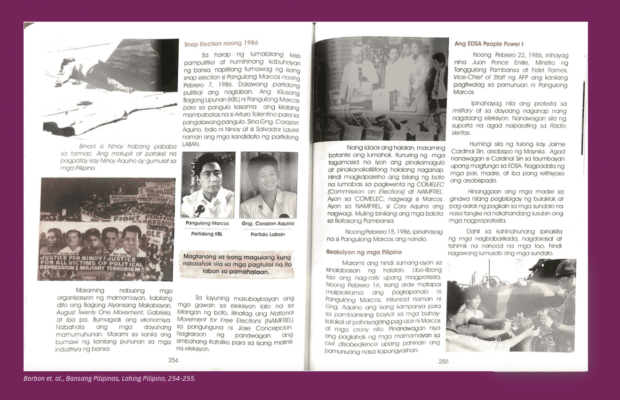
(Screenshot from the ‘The Dilemma of Philippine History Textbooks.’ / FEU Public Policy Center)
MANILA, Philippines — Several civic education initiatives were launched by The Youth Leadership for Democracy Program (YouthLed) under the Asia Foundation today.
The even coincided with its annual Civic Education Summit held in Manila City.
Among the organization’s projects are YouthLed’s SibikaHubs, a civic engagement network to be established in schools all over the country; a Project Citizen relaunch, an education program on the effects of public policy; and the a textbook review entitled ‘The Dilemma of Philippine History Textbooks,’ a program that researched and corrected inaccuracies in various Philippine history resources.
WATCH: Asst. Sec. Galban stresses the role of strengthened civic education in developing critical thinking and combatting disinformation and “fake news.” @inquirerdotnet pic.twitter.com/WdSyM6i8O8
— Sofia Abrogar (@SAbrogarINQ) April 28, 2023
YouthLed’s umbrella initiative is its Sibika Hubs, an education and engagement network that aims to make civic society and action “digestible, localized, and inclusive for all youth sectors.”
Funded by the U.S. Agency for International Development (USAID), the project aims to establish a Sibika Hub in partner campuses in each of 12 regional clusters throughout the country.
“So far meron kaming dalawa, Faith colleges Southern Luzon which represents Southern Luzon (Calabarzon and Mimaropa), and UP Visayas for Western Visayaas. So we’re looking for 10 more schools in other regional clusters, nang mabuo ‘yung 12 by June,” said YouthLed’s civic education officer Marion Villar in an interview with Inquirer.
(So far we have two partners, Faith Colleges in Southern Luzon (Calabarzon and Mimaropa), and UP Visayas for Western Visayas. So we’re looking for 10 more schools in other regional clusters to complete the 12 by June.)
The democratic youth program’s long-term goal is to ensure that teachers and administrators in each partner school will be equipped to sustain its hub when YouthLed ends in 2025.
“We have a criteria to make sure na the school is really qualified to be a Sibika Hub. Kasi after the 5 years of YouthLed until 2025, sila na yung magtutuloy ng mga ginagawa namin sa YouthLed. So that’s the idea, the sustainability aspect of it,” answered Villar when asked about the selection process for partner schools.
(We have a criteria to make sure na the school is really qualified to be a Sibika Hub. Because after the 5 years of YouthLed until 2025, they will continue the work we began at YouthLed. So that’s the idea, the sustainability aspect of it.
WATCH: Under Sibika Hubs efforts, YouthLed is also set to roll out an enhanced version of Project Citizen, according to civic education officer Marion Villar. @inquirerdotnet pic.twitter.com/znQssnO3o9
— Sofia Abrogar (@SAbrogarINQ) April 28, 2023
YouthLed has also partnered with the Far Eastern University (FEU) Public Policy Center to create an online interactive publication titled ‘The Dilemma of Philippine History Textbooks,’ a resource review that corrected inaccuracies in 14 AP textbooks of students in the 5th-6th grades.
Written by five history professors from the University of the Philippines Diliman, the project is categorized into three themes – corrections of historical inaccuracies, recommendations to forward civic goals, and setting facts straight about Martial Law confusions.
The professors stress that ensuring precision in Philippine textbooks is of utmost importance, as they are “the primary, in most instances, the sole, learning resource” accessible to students nationwide.
“Historical content is not free of perspective. The content does not write itself. It is selected for not everything that happened can be covered by the textbook. The organization and emphasis of historical information are the product of not only the author’s prior factual knowledge of Philippine history, but also an understanding of what is (and is not) significant,” they said.